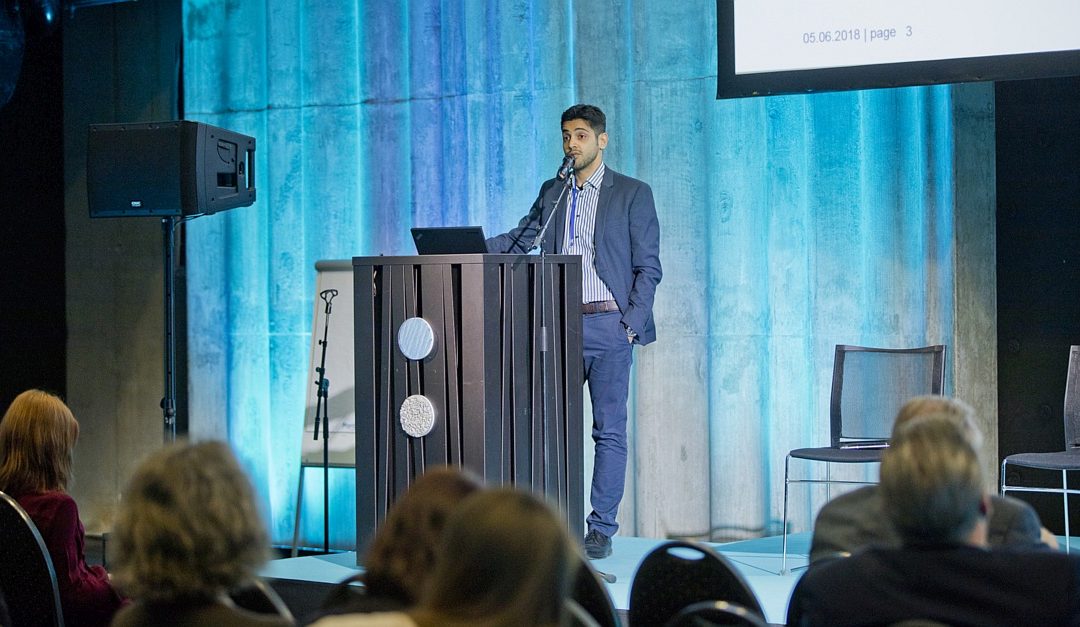Every year, the forum of the European Union Strategy for the Baltic Sea Region brings together stakeholders who are working to make the Baltic Sea region future-proof, environmentally sustainable and economically strong. At this year’s event on 4 and 5 June in Tallinn (Estonia), aconium GmbH employees Peyman Khodabakhsh and Darijus Valiucko presented solutions from the Interreg V B project CORA (COnnecting Remote Areas with digital infrastructure and services), which are intended to help drive digitalisation forward together with stakeholders in the region.
The Council of Baltic States Secretariat (CBSS Secretariat) (Daria Akhutina), the City of Turku (Mikko Lohikoski), Centrum Balticum and aconium organized a conference entitled “Digitalising and connecting the neighbourhood: solutions for the BSR”. Trends and developments in digitalisation were presented there. Peyman Khodabakhsh explained the CORA approach and set the framework for the discussion: In order to make the Baltic Sea region fit for the digital world after 2020, digital infrastructure, digital skills and digital services are needed. According to Khodabakhsh, local administrations need and welcome any support in building digital ecosystems.
Other experts from the Baltic Sea region shared their experiences on the topic: Lars Ahlbäck, CEO of Tilaajavastuu, a Finnish online platform that helps with tax and administrative matters, spoke about digital services and presented the joint transnational programme for data usage, which aims to build trust and partnerships in the real estate and construction sectors. Jury Vorotnitsky, Chairman of the Digitisation Department of the Belarusian State University, spoke about digital skills and explained that the development of special master’s programmes in the field of integrated systems design is essential to train the much-needed personnel for the future.
Svetlana Kochkaeva, Manager at the Future Center for Science and Technology at ITMO University of St. Petersburg, focused on the macro perspective and explained that it is necessary to prepare for several possible versions of the future. Strategic cooperation will play a particularly important role in view of the global challenges for the development of regions.
To show how the knowledge and examples from projects can be applied, the participants discussed the case of the city of Turku together. Juhani Ailio from Centrum Balticum presented forecasts on indicators such as expected growth (over 5 percent by 2030) and the ageing process of the population (more than 24 percent are expected to be over 65 years old by 2030), as well as decreasing unemployment combined with increasing demand for highly qualified employees and a comparatively good broadband infrastructure. Based on the figures presented, the participants made recommendations for regional development in Turku and the surrounding area, which can be summarized as follows:
- Broadening the perspective and improving the framework conditions for innovation and intelligent solutions
- Improve the flow of information and data between authorities and administrations and encourage global thinking – including “crazy ideas” – and the implementation of these ideas in local action.
All participants and speakers will use the experience gained from the presentations and discussions for their current work and in the numerous upcoming projects. The event will take place in Gdansk in June 2019. It will then become clear whether and how the ideas presented have worked.
About CORA
The Interreg IV B NSR project CORA is dedicated to promoting digital infrastructure, services and skills in rural areas. It supports local authorities in identifying common challenges and encourages them to share experiences and develop innovative solutions to create a sustainable digital environment. The CORA partners are developing a model with a comprehensive guideline for the digitalisation of regions away from metropolitan areas. aconium is the project developer, accompanies the lead partner in project and financial management and leads the communication work package in CORA.
Photo: Peyman Khodabakhsh (Project Manager aconium) presents the project CORA. Forum of the European Union Strategy for the Baltic Sea Region. Tallinn (Estonia), June 4, 2018.
Photo credit: Estonian Ministry of Foreign Affairs

